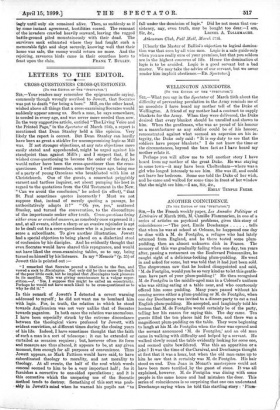LETTERS TO THE EDITOR.
CROSS-QUESTIONERS CROSS-QUESTIONED.
[TO THE EDITOR OP TEE "SPECTATOR."] Six,—Your readers may remember the epigrammatic saying, commonly though wrongly ascribed to Jowett, that Socrates was put to death " for being a bore." Mill, on the other hand, wished above all things that a cross-examining Socrates would suddenly appear among us. Such a man, he says somewhere, is needed in every age, and was never more needed than now. In the very suggestive article, entitled "The Living Voice and the Printed Page," in the Spectator of March 25th, a report is mentioned that Dean Stanley held a like opinion. Very likely the report is correct. But Dean Stanley can hardly have been as great a stickler for uncompromising logic as Mill was. If not stronger objections, at any rate objections more easily stated and apprehended, might be urged against his standpoint than against Mill's ; and I suspect that, if he wished cross-questioning to become the order of the day, he would rather have been the cross-questioner than the cross- questionee. I well remember, some forty years ago, being one of a party of young Oxonians who breakfasted with him at Christchurch. One of the guests, a somewhat priggishly earnest and tactless inquirer, set about pumping his host in regard to the quotations from the Old Testament in the New. "Can we avoid the conclusion," he asked (in effect), " that St. Paul sometimes quotes incorrectly 4 Must we not suppose that, instead of merely quoting a passage, he authoritatively adapts it ?" " Oh yes, yes," muttered Stanley, and turned the conversation, to the discomfiture of the importunate seeker after truth. Cross-questions bring either cross or crooked answers, as somebody once expressed it ; and, at all events, either a sharp or an evasive rejoinder is apt to be dealt out to a cross-questioner who is a junior or in any sense a subordinate. To give another illustration. Jowett had a special objection to being placed on a dialectical stool of confession by his disciples. And he evidently thought that even Socrates would have shared this repugnance, and would not have liked the cross-examining tables, so to say, being turned on himself by his listeners. In my "Memoir " (p. 35) of Jowett this is pointed out :- " I remarked that Socrates poured a libation to the Sun, and vowed a oock to 2Esculapius. Not only did he thus cause the death of the poor little cock, but he implied that 1Esculapius took pleasure in its sacrifice. This was giving countenance to a vulgar super- stition.—.T. Yes, I suppose this might be called an eccentricity. Perhaps he would not have much liked to be cross-questioned as to why he did it."
In this remark of Jowett's I detected a covert warning addressed to myself ; he did not want me to bombard him with logic. . For, in truth, the relation in which he stood towards Anglicanism was not very unlike that of Socrates towards paganism. In both cases the relation was anomalous. I have been especially struck by the extreme discordance between the theological views professed by Jowett, with evident conviction, at different times during the closing years of his life. Indeed, I have sometimes thought that the faith of such a man is a sort of telescope : it can be extended or curtailed as occasion requires ; but, however often its form and measure are thus altered, it appears to be, at any given moment, firm enough for all purposes of convenience. Thus Jowett appears, as Mark Pattison would have said, to have subordinated theology to morality, and not morality to theology. At all events, the half of the soul which words conceal seemed to him to be a very important half ; for it furnishes a. corrective to one-sided speculations ; and it is this corrective which the unsparing use of the Socratic method tends to destroy. Something of this sort was prob- ably in Jowett's mind when he warned his pupils not "to fall under the dominion of logic." Did he not mean that con- sistency, nay, even truth, may be bought too dear.—I am, Athena'um Club, Pall Mall, March 27th.
[Clearly the Master of Balliol's objection to logical domino,- tion was that seen by all wise men. Logic is a safe guide only when you are really sure of your premises, but that you seldom are in the highest concerns of life. Hence the domination of logic is to be avoided. Logic is a good servant but a bad master. We may take the advice of our servant, but we never render him implicit obedience.—En. Spectator.]






































 Previous page
Previous page